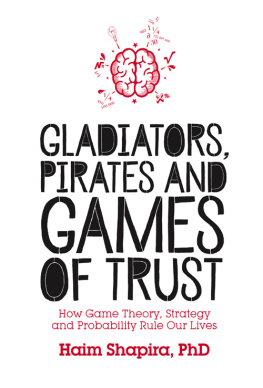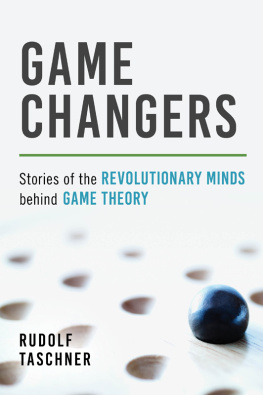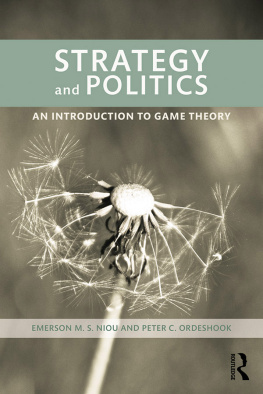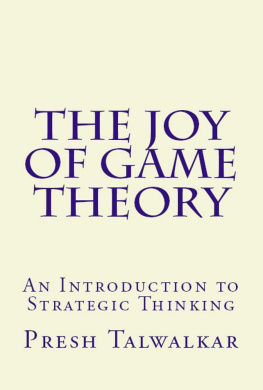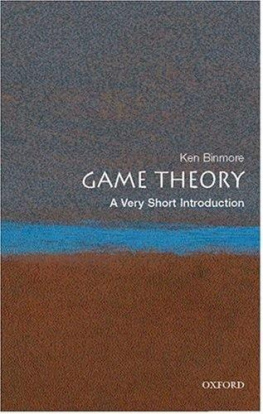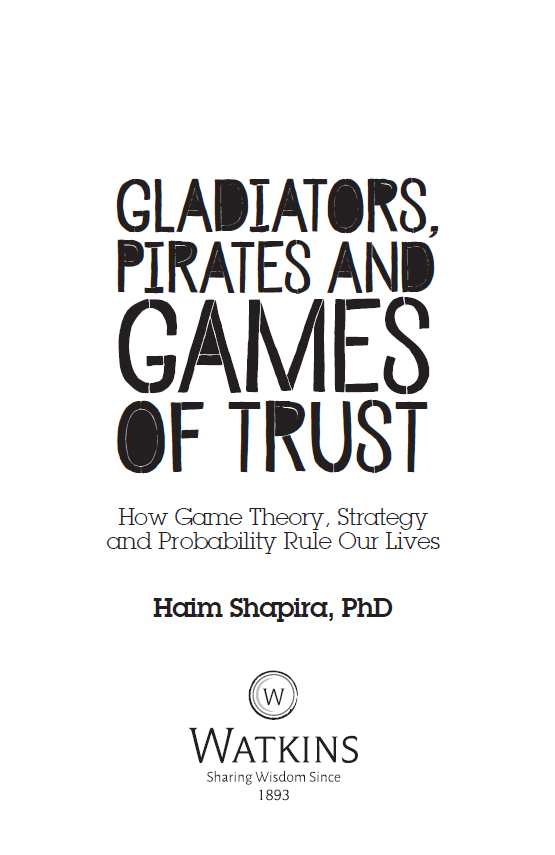Haim Shapira was born in Lithuania in 1962. In 1977 he emigrated to Israel, where he earned a PhD in mathematical genetics for his dissertation on Game Theory and another PhD for his research on the mathematical and philosophical approaches to infinity. He now teaches mathematics, psychology, philosophy and literature. He is an author of seven bestselling books. His stated mission as a writer is not to try to make his readers agree with him, but simply to encourage them to enjoy thinking. One of Israels most popular and soughtafter speakers, he lectures on creativity and strategic thinking, existential philosophy and philosophy in childrens literature, happiness and optimism, nonsense and insanity, imagination and the meaning of meaning, as well as friendship and love. He is also an accomplished pianist and an avid collector of anything beautiful.
FROM THE SAME AUTHOR:
Conversations on Game Theory
Things that Matter
Infinity: The Neverending Story
Ecclesiastes: The Biblical Philosopher
Nocturnal Musings
A Book of Love
Happiness and Other Small Things of Absolute Importance
This edition published in the UK and USA 2017 by
Watkins, an imprint of Watkins Media Limited
19 Cecil Court, London WC2N 4EZ
Design and typography copyright Watkins Media Limited 2017
Text copyright Haim Shapira 2017
Haim Shapira has asserted his right under the Copyright, Designs and Patents Act 1988 to be identified as the author of this work.
All rights reserved. No part of this book may be reproduced or utilized in any form or by any means, electronic or mechanical, without prior permission in writing from the Publishers.
1 3 5 7 9 10 8 6 4 2
Typeset by JCS Publishing Services Ltd, www.jcs-publishing.co.uk
Printed and bound in Finland
A CIP record for this book is available from the British Library
ISBN: 978-178678-010-2
www.watkinspublishing.com
CONTENTS
Chapter 1 The Diners Dilemma
(How to Lose Many Friends Really Fast)
(A Little on the Connections between the
Nash Equilibrium, Buffaloes, Matchmaking and the Nobel Prize)
INTRODUCTION
This book deals with Game Theory, introducing some important ideas about probabilities and statistics. These three fields of thought constitute the scientific foundation of the way we make decisions in life. Although these topics are quite serious, Ive made a tremendous effort not to be boring and to write a book thats rigorous and amusing. After all, enjoying life is just as important as learning.
And so, in this book we will
Meet the Nobel Prize laureate John F Nash and familiarize ourselves with his celebrated equilibrium
Learn the basic ideas of the art of negotiation
Review every aspect of the Prisoners Dilemma and learn about the importance of cooperation
Introduce the world champion in strategic thinking
Examine the Stable Marriage Problem and find out how it led to a Nobel Prize
Visit a gladiators ring and apply for a coaching position
Bid in a tender at auction and hope to avoid the Winners Curse
Learn how statistics bolster lies
Become acquainted with the presence of probabilities in operating theatres
Discover what the game of Chicken had to do with the Cuban missile crisis
Build an airport and divide an inheritance
Issue ultimatums and learn to trust
Partake in John Maynard Keyness beauty competition and study its association with stock trading
Discuss the concept of justice as seen through the eyes of Game Theory
Meet Captain Jack Sparrow and find out how democratic pirates divide their treasures
Find optimal strategies for playing at roulette tables
Chapter 1
THE DINERS DILEMMA
(How to Lose Many Friends Really Fast)
In this chapter well visit a bistro in order to find out what Game Theory is all about and why its so important. Ill also provide many examples of Game Theory in our daily lives.
Imagine the following situation: Tom goes to a bistro, sits down, looks at the menu, and realizes that they serve his favourite dish: Tournedos Rossini. Attributed to the great Italian composer Gioachino Rossini, its made of beef tournedos (filet mignon) pan-fried in butter, served on a crouton, and topped with a slice of foie gras, garnished with slices of black truffle, and finished with Madeira demi-glace. In short, it has everything you need to help your heart surgeon make a fine living. Its a very tasty dish indeed, but its very expensive too. Suppose it costs $200. Now Tom must decide: to order or not to order. This may sound very dramatic, Shakespearean even, but not really a hard decision to make. All Tom needs to do is decide whether the pleasure the dish will give him is worth the quoted price. Just remember, $200 means different things to different
people. For a street beggar, its a fortune; but if you were to put $200 into Bill Gatess account, it wouldnt make any kind of difference. In any event, this is a relatively simple decision to make, and has nothing to do with Game Theory.
Why, then, am I telling you this story? How does Game Theory fit here?
This is how. Suppose Tom isnt alone. He goes to the same bistro with nine friends, making a total of 10 around the table, and they all agree not to go Dutch, but to split the bill evenly. Tom then waits politely until everyone has ordered their simple dishes: home fries; a cheese burger; just coffee; a soda; nothing for me, thanks; hot chocolate; and so on. When they are done, Tom is struck by an ingenious idea and drops the bomb: Tournedos Rossini for me, per favore. His decision seems very simple and both economically and strategically sound: he treats himself to Rossinis gourmet opera and pays just over 10 per cent of its advertised price.
Did Tom make the right choice? Was it really such a great idea after all? What do you think will happen next around the table? (Or as mathematicians would ask, What will be the dynamic of the game?)
FOR EVERY ACTION THERES A REACTION
(THE ABRIDGED VERSION OF NEWTONS THIRD LAW)
Knowing Toms friends, I can tell you that his move is a declaration of war. The waiter is called back, and everyone suddenly remembers they are very hungry, particularly for the high end of the menu. Home fries are soon replaced by a slice of Robuchon truffle pie. The cheese burger is cancelled, and a two-pound steak is ordered instead. All of Toms friends suddenly appear to be great connoisseurs and order from the expensive part of the menu. Its an avalanche, an economic disaster, accompanied by several expensive bottles of wine. When the check finally comes and the bill is equally divided, each diner has to pay $410!
Incidentally, scientific studies have shown that when several diners split a bill, or when food is handed out for free, people tend to order more Im sure youre not surprised by that.
Tom realizes hes made a terrible mistake, but is he the only one? Fighting for their pride and attempting to avoid being fooled by Tom in this way, everyone ends up paying much more than theyd initially intended for food they never meant to order. And dont get me started on their caloric intake
Should they have paid much less and let Tom enjoy his dream dish? You decide. In any event, that was the last time this group of friends went out together.
This scene in the restaurant demonstrates the interaction between several decision-makers and is a practical example of issues that Game Theory addresses.
Next page
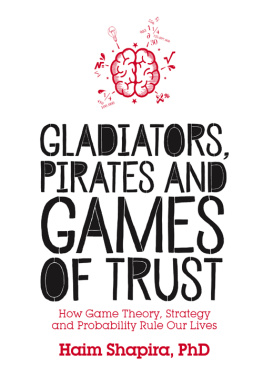
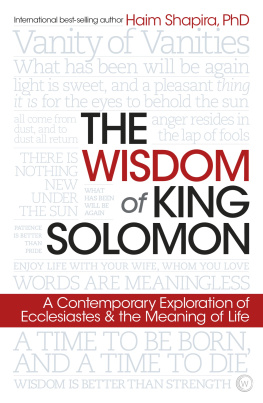

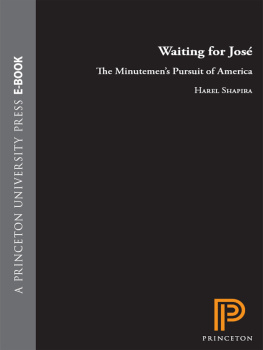

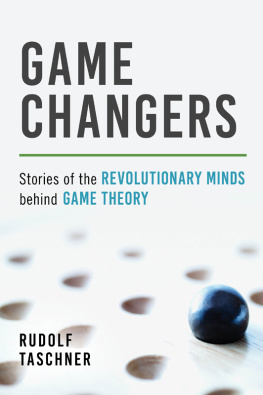
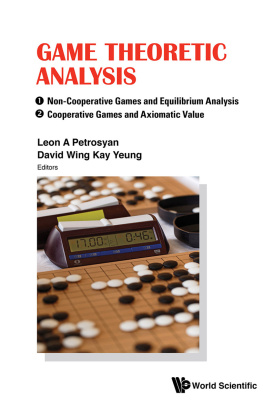
![Chris Bateman [Chris Bateman] - Beyond Game Design: Nine Steps Toward Creating Better Videogames](/uploads/posts/book/119409/thumbs/chris-bateman-chris-bateman-beyond-game-design.jpg)
